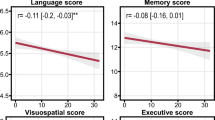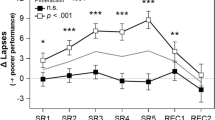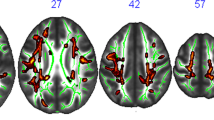Abstract
Objective:
Cortisol is elevated in individuals with both increased emotional stress and higher percentages of body fat. Cortisol is also known to affect cognitive performance, particularly spatial processing and working memory. We hypothesized that increased body fat might therefore be associated with decreased performance on a spatial processing task, in response to an acute real-world stressor.
Design:
We tested two separate samples of participants undergoing their first (tandem) skydive. In the first sample (N=78), participants were tested for salivary cortisol and state anxiety (Spielberger State Anxiety Scale) during the plane's 15-min ascent to altitude in immediate anticipation of the jump. In a second sample (N=20), participants were tested for salivary cortisol, as well as cardiac variables (heart rate, autonomic regulation through heart rate variability) and performance on a cognitive task of spatial processing, selective attention and working memory.
Results:
In response to the skydive, individuals with greater body fat percentages showed significantly increased reactivity for both cortisol (on both samples) and cognition, including decreased accuracy of our task of spatial processing, selective attention and working memory. These cognitive effects were restricted to the stress response and were not found under baseline conditions. There were no body fat interactions with cardiac changes in response to the stressor, suggesting that the cognitive effects were specifically hormone mediated rather than secondary to general activation of the autonomic nervous system.
Conclusions:
Our results indicate that, under real-world stress, increased body fat may be associated with endocrine stress vulnerability, with consequences for deleterious cognitive performance.
This is a preview of subscription content, access via your institution
Access options
Subscribe to this journal
Receive 12 print issues and online access
$259.00 per year
only $21.58 per issue
Buy this article
- Purchase on Springer Link
- Instant access to full article PDF
Prices may be subject to local taxes which are calculated during checkout



Similar content being viewed by others
References
Bremner JD, Randall P, Scott TM, Bronen RA, Seibyl JP, Southwick SM et al. MRI-based measurement of hippocampal volume in patients with combat-related posttraumatic stress disorder. Am J Psychiatry 1995; 152: 973–981.
Lupien SJ, de Leon M, de Santi S, Convit A, Tarshish C, Nair NP et al. Cortisol levels during human aging predict hippocampal atrophy and memory deficits. Nat Neurosci 1998; 1: 69–73.
Wellman CL . Dendritic reorganization in pyramidal neurons in medial prefrontal cortex after chronic corticosterone administration. J Neurobiol 2001; 49: 245–253.
Kirschbaum C, Wolf OT, May M, Wippich W, Hellhammer DH . Stress- and treatment-induced elevations of cortisol levels associated with impaired declarative memory in healthy adults. Life Sci 1996; 58: 1475–1483.
Newcomer JW, Selke G, Melson AK, Hershey T, Craft S, Richards K et al. Decreased memory performance in healthy humans induced by stress-level cortisol treatment. Arch Gen Psychiatry 1999; 56: 527–533.
de Kloet ER, Oitzl MS, Joels M . Stress and cognition: are corticosteroids good or bad guys? Trends Neurosci 1999; 22: 422–426.
Lupien SJ, McEwen BS . The acute effects of corticosteroids on cognition: integration of animal and human model studies. Brain Res Brain Res Rev 1997; 24: 1–27.
Roozendaal B . Stress and memory: opposing effects of glucocorticoids on memory consolidation and memory retrieval. Neurobiol Learn Mem 2002; 78: 578–595.
Cahill L, Gorski L, Le K . Enhanced human memory consolidation with post-learning stress: interaction with the degree of arousal at encoding. Learn Mem 2003; 10: 270–274.
de Quervain DJ, Roozendaal B, McGaugh JL . Stress and glucocorticoids impair retrieval of long-term spatial memory. Nature 1998; 394: 787–790.
Roozendaal B . 1999 Curt P. Richter award. Glucocorticoids and the regulation of memory consolidation. Psychoneuroendocrinology 2000; 25: 213–238.
Bjorntorp P . Body fat distribution, insulin resistance, and metabolic diseases. Nutrition 1997; 13: 795–803.
Epel ES, McEwen B, Seeman T, Matthews K, Castellazzo G, Brownell KD et al. Stress and body shape: stress-induced cortisol secretion is consistently greater among women with central fat. Psychosom Med 2000; 62: 623–632.
Pedersen SB, Jonler M, Richelsen B . Characterization of regional and gender differences in glucocorticoid receptors and lipoprotein lipase activity in human adipose tissue. J Clin Endocrinol Metab 1994; 78: 1354–1359.
Starkman MN, Gebarski SS, Berent S, Schteingart DE . Hippocampal formation volume, memory dysfunction, and cortisol levels in patients with Cushing's syndrome. Biol Psychiatry 1992; 32: 756–765.
Lapidus L, Bengtsson C, Hallstrom T, Bjorntorp P . Obesity, adipose tissue distribution and health in women—results from a population study in Gothenburg, Sweden. Appetite 1989; 13: 25–35.
Lloyd CE, Wing RR, Orchard TJ . Waist to hip ratio and psychosocial factors in adults with insulin-dependent diabetes mellitus: the Pittsburgh Epidemiology of Diabetes Complications study. Metab Clin Exp 1996; 45: 268–272.
Rosmond R, Lapidus L, Marin P, Bjorntorp P . Mental distress, obesity and body fat distribution in middle-aged men. Obes Res 1996; 4: 245–252.
Wing RR, Matthews KA, Kuller LH, Meilahn EN, Plantinga P . Waist to hip ratio in middle-aged women. Associations with behavioral and psychosocial factors and with changes in cardiovascular risk factors. Arterioscler Thromb 1991; 11: 1250–1257.
Lupien SJ, Maheu F, Tu M, Fiocco A, Schramek TE . The effects of stress and stress hormones on human cognition: implications for the field of brain and cognition. Brain Cogn 2007; 65: 209–237.
Fiocco AJ, Joober R, Lupien SJ . Education modulates cortisol reactivity to the Trier Social Stress Test in middle-aged adults. Psychoneuroendocrinology 2007; 32: 1158–1163.
Rimmele U, Zellweger BC, Marti B, Seiler R, Mohiyeddini C, Ehlert U et al. Trained men show lower cortisol, heart rate and psychological responses to psychosocial stress compared with untrained men. Psychoneuroendocrinology 2007; 32: 627–635.
Tyrka AR, Wier LM, Anderson GM, Wilkinson CW, Price LH, Carpenter LL . Temperament and response to the Trier Social Stress Test. Acta psychiatrica Scandinavica 2007; 115: 395–402.
Conway TL, Cronan TA, Peterson KA . Circumference-estimated percent body fat vs weight-height indices: relationships to physical fitness. Aviat Space Environ Med 1989; 60: 433–437.
Babcock CJ, Kirby TE, McCarroll ML, Devor ST . A comparison of military circumference equations to skinfold-based equations to estimate body composition. Mil Med 2006; 171: 60–63.
Gallagher P, Leitch MM, Massey AE, McAllister-Williams RH, Young AH . Assessing cortisol and dehydroepiandrosterone (DHEA) in saliva: effects of collection method. J Psychopharmacol 2006; 20: 643–649.
Knight RG, Waal-Manning HJ, Spears GF . Some norms and reliability data for the State—Trait Anxiety Inventory and the Zung Self-Rating Depression scale. Br J Clin Psychol 1983; 22 (Part 4): 245–249.
Mujica-Parodi LR, Korgaonkar M, Ravindranath B, Greenberg T, Tomasi D, Wagshul M et al. Limbic dysregulation is associated with lowered heart rate variability and increased trait anxiety in healthy adults. Hum Brain Mapp 2007 November 27. [Epub ahead of print].
Gottschaldt K . Über den Einfluss der Erfahrung auf die Wahmehmung von Figuren II. Psychol Forsch 1929; 12: 1–87.
Zuckerman M, Link K . Construct validity for the sensation-seeking scale. J Consult Clin Psychol 1968; 32: 420–426.
Zuckerman M . Behavioural Expressions and Biosocial Bases of Sensation Seeking. Cambridge University Press: Cambridge, 1994.
Franken RE, Gibson KJ, Rowland GL . Sensation Seeking and the tendency to view the world as threatening. Pers Individ Diff 1992; 13: 31–38.
Bray GA . Autonomic and endocrine factors in the regulation of food intake. Brain Res Bull 1985; 14: 505–510.
Willox JC, Corr J, Shaw J, Richardson M, Calman KC, Drennan M . Prednisolone as an appetite stimulant in patients with cancer. BMJ (Clin Res Ed) 1984; 288: 27.
Tataranni PA, Larson DE, Snitker S, Young JB, Flatt JP, Ravussin E . Effects of glucocorticoids on energy metabolism and food intake in humans. Am J Physiol 1996; 271: E317–E325.
Grunberg NE, Straub RO . The role of gender and taste class in the effects of stress on eating. Health Psychol 1992; 11: 97–100.
Yerkes RM, Dodson JD . The relation of strength of stimulus to rapidity of habit-formation. J Comp Neurol Psychol 1908; 18: 459–482.
Cresci B, Tesi F, La Ferlita T, Ricca V, Ravaldi C, Rotella CM et al. Group versus individual cognitive-behavioral treatment for obesity: results after 36 months. Eat Weight Disord 2007; 12: 147–153.
Butryn ML, Phelan S, Hill JO, Wing RR . Consistent self-monitoring of weight: a key component of successful weight loss maintenance. Obesity (Silver Spring) 2007; 15: 3091–3096.
Forman EM, Hoffman KL, McGrath KB, Herbert JD, Brandsma LL, Lowe MR . A comparison of acceptance- and control-based strategies for coping with food cravings: an analog study. Behav Res Ther 2007; 45: 2372–2386.
Stahre L, Tarnell B, Hakanson CE, Hallstrom T . A randomized controlled trial of two weight-reducing short-term group treatment programs for obesity with an 18-month follow-up. Int J Behav Med 2007; 14: 48–55.
Munsch S, Biedert E, Meyer A, Michael T, Schlup B, Tuch A et al. A randomized comparison of cognitive behavioral therapy and behavioral weight loss treatment for overweight individuals with binge eating disorder. Int J Eat Disord 2007; 40: 102–113.
Nasser JA, Gluck ME, Geliebter A . Impulsivity and test meal intake in obese binge eating women. Appetite 2004; 43: 303–307.
Melchionda N, Besteghi L, Di Domizio S, Pasqui F, Nuccitelli C, Migliorini S et al. Cognitive behavioural therapy for obesity: one-year follow-up in a clinical setting. Eat Weight Disord 2003; 8: 188–193.
Acknowledgements
This research was supported by funding from the Office of Naval Research N0014-04-1-005 (LRMP), the US Army Soldier Systems Center Natick DAAD16-99-C-1033 (LRMP) and the National Institutes of Health 5-MO1-RR-10710 (Stony Brook University General Clinical Research Center).
Author information
Authors and Affiliations
Corresponding author
Rights and permissions
About this article
Cite this article
Mujica-Parodi, L., Renelique, R. & Taylor, M. Higher body fat percentage is associated with increased cortisol reactivity and impaired cognitive resilience in response to acute emotional stress. Int J Obes 33, 157–165 (2009). https://doi.org/10.1038/ijo.2008.218
Received:
Revised:
Accepted:
Published:
Issue Date:
DOI: https://doi.org/10.1038/ijo.2008.218
Keywords
This article is cited by
-
Longitudinal determination of resilience in humans to identify mechanisms of resilience to modern-life stressors: the longitudinal resilience assessment (LORA) study
European Archives of Psychiatry and Clinical Neuroscience (2021)
-
Heart rate variability and critical flicker fusion frequency changes during and after parachute jumping in experienced skydivers
European Journal of Applied Physiology (2015)



